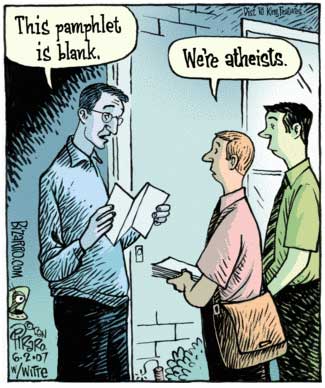 While it is important to reassure a potential convert that becoming a Christian does not require one to check reason at the door, one should remember that secular humanists are humans. To share Christianity with a secular humanist one does not necessarily have to have a command of these rather complex scientific and philosophical arguments. Atheism is counter intuitive to nearly everyone. Even an anti-theist like Sam Harris concedes that, “there is clearly a sacred dimension to our existence, and coming to terms with it could well be the highest purpose of human life.”[1] Like all people they suffer from the devastating results of sin. The bible tells us that “men suppress the truth in unrighteousness” (Rom. 1:18). If we can help them to address their unrighteousness by pointing to Christ’s redemptive work, often their truth suppression is mitigated. They need forgiveness yet do not acknowledge it. We can offer them help dealing with addictions where secular methods fail. They struggle for love and acceptance like all other humans. It is important to share the love and unique message of Jesus Christ as many secular humanists have only a sardonic caricature of Christianity in mind. An ardent atheist will likely be suspicious that Christians view their conversion as a trophy. It is important to develop a relationship and to demonstrate genuine care before making an evangelistic appeal.
While it is important to reassure a potential convert that becoming a Christian does not require one to check reason at the door, one should remember that secular humanists are humans. To share Christianity with a secular humanist one does not necessarily have to have a command of these rather complex scientific and philosophical arguments. Atheism is counter intuitive to nearly everyone. Even an anti-theist like Sam Harris concedes that, “there is clearly a sacred dimension to our existence, and coming to terms with it could well be the highest purpose of human life.”[1] Like all people they suffer from the devastating results of sin. The bible tells us that “men suppress the truth in unrighteousness” (Rom. 1:18). If we can help them to address their unrighteousness by pointing to Christ’s redemptive work, often their truth suppression is mitigated. They need forgiveness yet do not acknowledge it. We can offer them help dealing with addictions where secular methods fail. They struggle for love and acceptance like all other humans. It is important to share the love and unique message of Jesus Christ as many secular humanists have only a sardonic caricature of Christianity in mind. An ardent atheist will likely be suspicious that Christians view their conversion as a trophy. It is important to develop a relationship and to demonstrate genuine care before making an evangelistic appeal.
Once there is trust, a particularly useful approach is the moral argument along the lines of C.S. Lewis’s Mere Christianity. Evolutionary explanations fail to adequately account for objective moral values. Given Darwinism, anything that provides for the survival of one’s own genetic material is deemed beneficial. So why is rape or murder evil, if you can get away with it? After all, it reduces the competition and spreads your DNA. Yet we seemingly know that it is wrong. Furthermore, relativism amounts to mob rule. For instance, there is no objective basis to judge that the holocaust was truly evil. As long as the majority of Germans agreed with what Hitler was doing, then it was moral-relatively speaking. Of course this is repugnant to most everyone and indeed it is here that secular humanism has failed most miserably. Unparalleled scientific progress has not delivered a secular utopia. It has led to a human nightmare. The twentieth century world total is 262,000,000 murdered by government and largely outside of war in the pursuit of the secular humanist ideal of Marxism.[2] The problem of evil is actually a much bigger problem for the atheist than the Christian. The bible provides a coherent explanation for evil and most of all it offers a real hope (Rev. 21:4).
[1] Sam Harris. The End of Faith. (New York: W.W. Norton & Company, 2005), 14.
[2] R.J. Rummel “20th Century Democide.” Freedom, Democracy, Peace; Power, Democide, and War. 11 23, 2002. http://www.hawaii.edu/powerkills/20TH.HTM (accessed 10 26, 2010).




